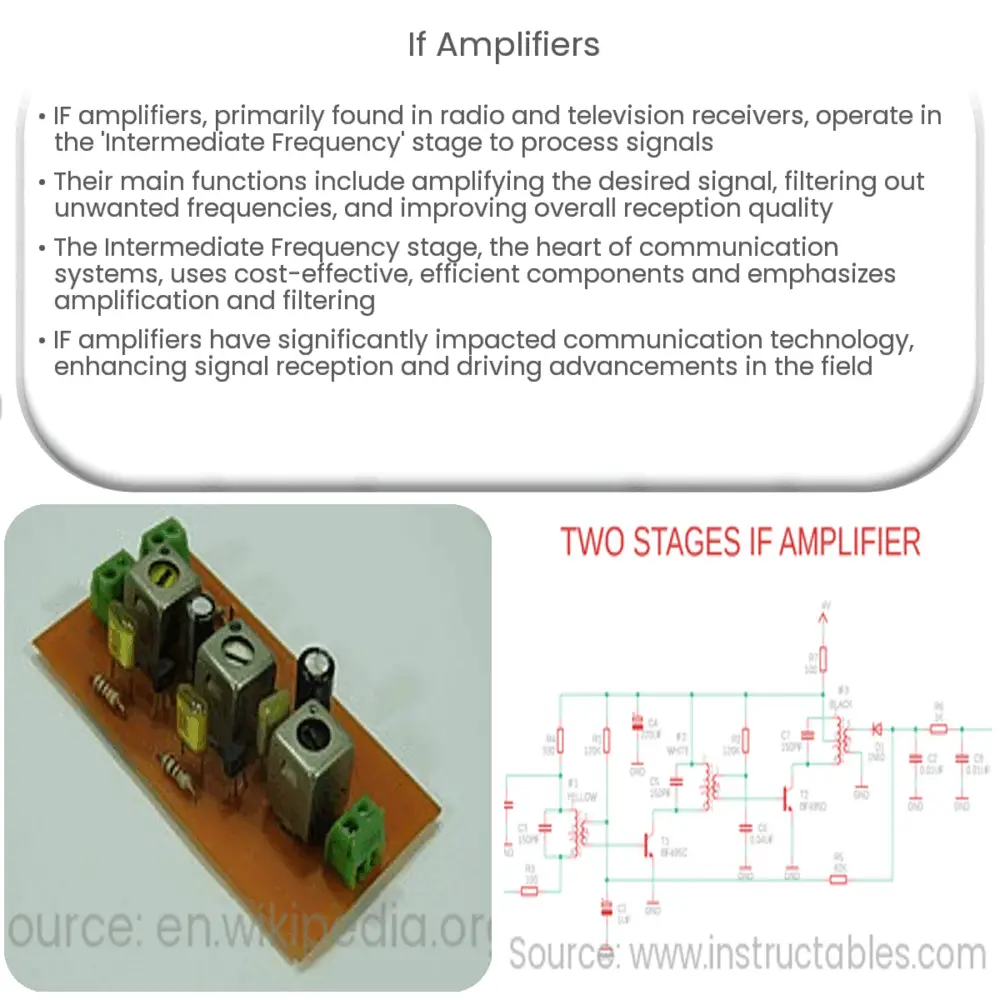Explore the vital role of IF Amplifiers in communication systems, their functionality, types, and their impact on modern technology.

Introduction to IF Amplifiers
IF amplifiers, or Intermediate Frequency Amplifiers, are a type of amplifier found primarily in radio and television receivers, designed specifically for signal processing at an intermediary stage. This intermediary stage is the ‘Intermediate Frequency’ stage, which lends the amplifier its name.
The Role of IF Amplifiers
The primary function of IF amplifiers is to amplify a modulated signal that is situated in an intermediary stage of a communication system. This amplification is integral to the reception and demodulation of signals, acting as a major part in the process that eventually delivers the sound and video content that we consume through these devices.
- Signal Enhancement: The main purpose of an IF amplifier is to amplify the desired signal. The gain of an IF amplifier can be adjusted to strengthen the signals, making it easier to separate the desired information from the surrounding noise.
- Filtering: IF amplifiers play an essential role in filtering out unwanted frequencies. By operating at a fixed frequency, IF amplifiers can utilize high-quality, stable filters to reject signals outside the desired frequency range.
- Improved Reception: Through signal enhancement and filtering, IF amplifiers improve the overall reception quality of a device, allowing for clearer, more consistent reception of signals.
The Intermediate Frequency Stage
The Intermediate Frequency stage in a communication system is often considered the heart of the device, where most of the amplification and filtering occurs. It is usually designed to work on a lower frequency than the carrier frequency. This approach has a few key advantages:
- 1It simplifies the design and allows for more efficient operation.
- 2It allows the use of cheaper, more compact components, as lower-frequency components are often less expensive and smaller in size.
- 3It allows the use of more selective filters, improving the performance of the system in rejecting unwanted signals.
In essence, IF amplifiers and the Intermediate Frequency stage are crucial for the successful reception, amplification, and demodulation of signals in a radio or television system.
Types of IF Amplifiers
There are different types of IF amplifiers based on the requirements of the device or system. Some of the most common ones include:
- Single-tuned IF Amplifiers: These are the simplest form of IF amplifiers. They are designed to amplify a single-frequency signal, and their operation is based on resonance at the desired frequency.
- Double-tuned IF Amplifiers: These amplifiers are capable of amplifying two frequencies simultaneously. They have two tuning circuits and are mostly used in high-frequency systems such as FM radio.
- Stagger-tuned IF Amplifiers: These amplifiers use a series of stagger-tuned stages to amplify a range of frequencies. This design allows for a wider bandwidth than single or double-tuned amplifiers.
The Impact of IF Amplifiers on Communication Technology
IF amplifiers have played a significant role in the evolution of communication technology. By providing the ability to amplify specific signals while filtering out others, these amplifiers have made it possible to receive high-quality radio and television broadcasts, even in areas with a lot of signal noise or interference. They have enabled the development of more sophisticated and efficient communication devices, contributing significantly to the modern era of communication.
Conclusion
In conclusion, IF amplifiers are a critical component in communication technology. Their role in signal enhancement, filtering, and improved reception is instrumental in delivering quality audio and visual content to the end-users. By operating at the Intermediate Frequency stage, they allow for efficient operation and the use of cost-effective, compact components. Whether it’s in radio or television receivers, the importance of IF amplifiers in communication systems cannot be overstated. As technology continues to evolve, it is anticipated that IF amplifiers will continue to adapt and contribute to the ever-advancing field of communication.

